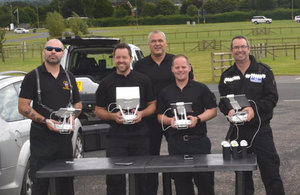Surveillance cameras on drones
Dorset, Devon and Cornwall police forces achieve third party certification for the surveillance cameras on their drones.

Dorset police force with their drones
Unmanned aerial vehicles (drones) are often fitted with surveillance cameras. If a relevant authority such as a police force is using them, they must comply with the surveillance camera code of practice.
Dorset, Devon and Cornwall police started using drones about 2 years ago and they are the first forces to have their drone use certified by the Surveillance Camera Commissioner through his third party certification scheme.
After the successful training of 2 pilots an official 6 month operational trial was commissioned to find out how drones could be used within the police for both planned and spontaneous incidents. They were able to deploy a drone where a helicopter was too expensive.
Martyn Underhill, Dorset Police and Crime Commissioner said:
I’ve seen first-hand how deploying drones at a road crash can reduce the impact on the public, especially in rural Dorset on the A35. Drones can capture 3D imagery and information from the scene in minutes rather than hours, and roads can be reopened much quicker.
They are also invaluable in helping with searches for missing people. I am convinced policing can take huge steps forward with this approach. Deploying a drone costs a fraction of the cost of a helicopter and they can also be used when a helicopter is unavailable.
Following the guiding principles
Dorset, Devon and Cornwall police forces followed the 12 guiding principles in the code, for example, ensuring that they made every effort to:
- involve the public and wider community
- inform them that they were considering using the drones
- inform them about how they would use the drones
Following the guiding principles put them in a good position to apply for the Surveillance Camera Commissioner’s third party certification scheme.
Ricky Fidler, Dorset Police said:
Applying for certification seemed an obvious next step for drones as this was another way to ensure that the processes we had in place were suitable and transparent. We found the whole process remarkably simple: most of the documentation that was required by the Surveillance Camera Commissioner we had already completed – a privacy impact assessment and so on. We are familiar with these documents within the police service as we use them in other areas of business.
Legitimate systems and processes
There are 2 steps to certification. The first step, desktop certification, is aimed at organisations that are working hard to achieve full compliance with the code but are aware that they may need more time to become fully compliant. The second step, full certification, is for organisations that are close to or fully compliant with the code. Dorset, Devon and Cornwall have achieved step 1.
Fidler added:
We would absolutely recommend other forces and organisations to apply for certification. It’s a real confidence boost to have someone responsible for the public’s interest check that our systems and processes are legitimate and human rights compliant. We will definitely apply for full certification within the 12 month period.
Third party certification is a great way to demonstrate compliance with the code to those of you are using surveillance cameras to protect, particularly if you are using new technologies that people may not be familiar with.
Police and Crime Commissioner Underhill said:
I am delighted to hear that Dorset Police has been granted certification from the Surveillance Commissioner’s Office for the use of drones. Policing needs to be at the forefront of technology and quick to embrace innovation. Whether it is helping search for a missing person, recording evidence for use in a criminal investigation or giving police officers a unique view of a particular situation, the potential drones have for helping forces is huge.
Find out how you can have your scheme certified against the surveillance camera code of practice.